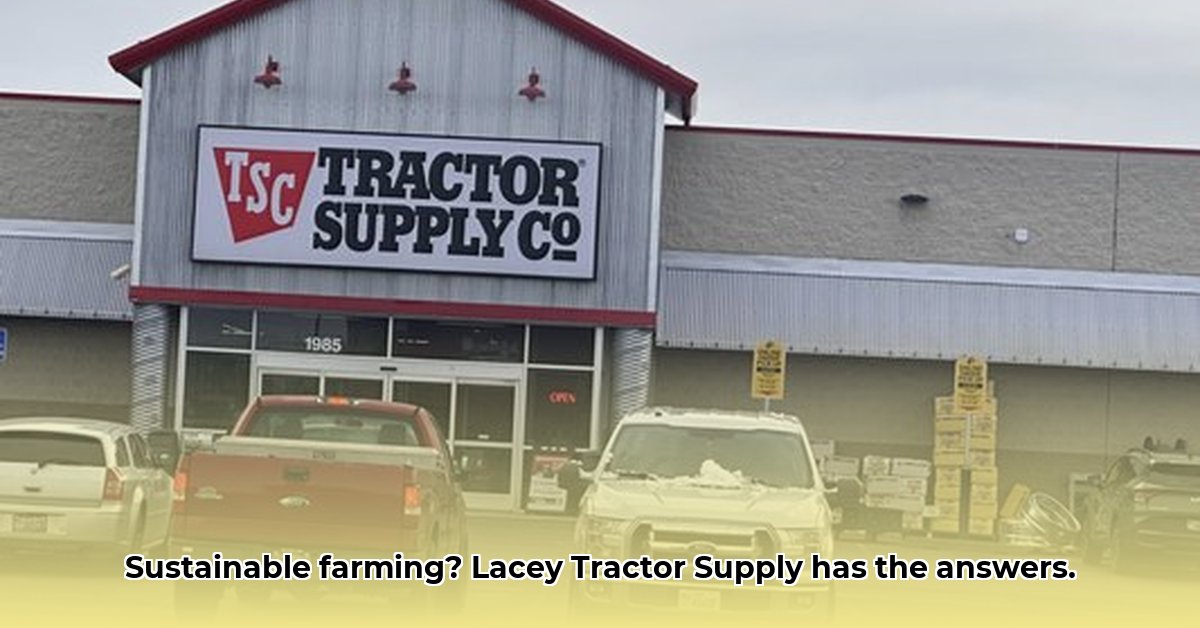
Supporting Sustainable Agriculture: A Mixed Bag
Lacey Tractor Supply (LTS) offers a wide range of products that can contribute to sustainable farming. Organic seeds, water-saving irrigation systems, and even fencing materials are readily available. This broad selection supports diverse, resilient farming methods, reducing reliance on potentially harmful synthetic chemicals. However, a critical gap exists: a lack of transparent information regarding LTS's own environmental performance. This lack of data hinders a complete assessment of their overall impact on sustainable agriculture. It's like having the tools but not knowing if the toolbox was built sustainably. For more information on sustainable farming practices, check out this helpful resource on diatomaceous earth.
How does the availability of sustainable products at LTS contribute to sustainable agriculture? Providing farmers with access to organic seeds and water-efficient irrigation systems directly supports environmentally friendly farming practices, thus contributing to broader sustainability goals.
The Need for Transparency: Understanding LTS's Environmental Footprint
While LTS provides the means for sustainable farming, the company has yet to publicly disclose crucial data about its own environmental efforts. What is LTS’s carbon footprint? What waste management strategies are employed? How does LTS ensure ethical and environmentally responsible sourcing of materials from its suppliers? Without this information, a complete evaluation of their contribution to sustainable agriculture remains impossible. This lack of transparency raises concerns about the depth of their commitment. "The absence of data leaves a significant gap," observes Dr. Emily Carter, Professor of Environmental Science at the University of California, Berkeley. This lack of transparency reduces consumer confidence and limits public accountability.
Actionable Steps: A Path Towards a Greener Future
Moving beyond criticisms, let's focus on concrete steps to improve sustainable agriculture, leveraging LTS's resources and engaging consumers and the company itself. These actions are categorized into short-term and long-term goals.
Short-Term Goals (Next 12 Months):
Clearer In-Store Messaging (LTS): Implement clear signage, labeling, and potentially a dedicated section for eco-friendly products to make sustainable choices readily apparent to shoppers. This simple change increases consumer awareness and encourages adoption of sustainable practices.
Employee Training (LTS): Train LTS employees to confidently answer customer questions about sustainable agriculture, transforming them into knowledgeable advocates for eco-conscious choices. This significantly improves the customer experience and promotes informed decision-making.
Farmer-Consumer Knowledge Sharing: Encourage local farmers to promote LTS as a sustainable supplier and offer in-store workshops or demonstrations, directly connecting experts with consumers. This collaborative approach strengthens local connections and promotes effective knowledge transfer.
Consumer Education: Empower consumers with information about sustainable farming practices. Even modest shifts in purchasing habits can collectively generate a significant positive impact.
Long-Term Goals (3-5 Years):
Comprehensive Sustainability Audit (LTS): Conduct a thorough audit encompassing the entire operation, from material sourcing to waste management, to accurately assess LTS's environmental footprint. This provides a baseline for future improvements and promotes transparency and accountability.
LTS Sustainability Plan: Develop a detailed sustainability plan based on the audit, outlining concrete steps to minimize environmental impact and including publicly reported progress updates. This plan should be supported by measurable targets and regular reporting.
Transparent Supply Chain (LTS): Establish and publicly share information about the sourcing of products, ensuring responsible practices throughout the supply chain. This builds consumer trust and promotes wider adoption of ethical sourcing practices.
Investment in Sustainable Innovation (LTS): Invest in research and development of new sustainable agricultural products, showcasing a long-term commitment to environmental responsibility. This could include funding for research collaborations with universities or agricultural institutions.
Strengthened Partnerships (LTS): Cultivate stronger relationships with suppliers committed to sustainable practices, potentially involving joint projects and initiatives. This collaborative approach fosters innovation and promotes widespread sustainable practices.
Collaboration and Advocacy (LTS & Farmers): Facilitate collaboration between LTS and local farmers to develop region-specific solutions for sustainable agriculture. Encourage farmers to advocate for supportive policies at local and regional levels. This combined approach maximizes the impact of local efforts.
Continued Consumer Pressure: Consumers must persistently advocate for increased transparency and sustainability from LTS and all businesses. Purchasing power is a significant tool for driving change.
A Collaborative Path Forward: Building a Sustainable Agricultural Future
Sustainable agriculture is paramount. Lacey Tractor Supply, through its reach and resources, holds a key position to foster positive change. By demanding transparency, supporting sustainable practices, and actively participating in these efforts, we can collectively build a healthier community and a more promising future for generations to come. It demands a united effort from farmers, businesses, and consumers alike.